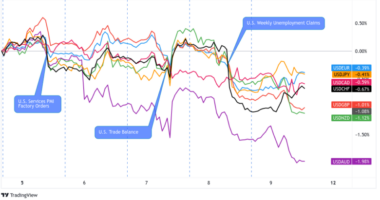With no major Brexit breakthroughs or top tier economic updates from the U.K., it was a choppy, low volatility week for the British Pound.
Overall, the pound closed as a net loser on Friday, likely due to the continued uncertainty with Brexit talks, and a round of net negative economic updates.


United Kingdom Headlines and Economic data
Monday:
Expansion of U.K. service sector remains marked in September
PM Johnson plays down technical failure of COVID-19 testing data system
Tuesday:
EU says that no-deal Brexit becoming ever more likely
UK construction activity expands sharply in September
UK hospitality trade warns of more than half a million job losses
In addition to negative Brexit sentiment, volatility and negative global risk sentiment was a likely contributor to Sterling’s weakness, which picked up quickly in the financial markets during the U.S. session after U.S. President Donald Trump halted Covid-19 relief aid talks until after election.
Wednesday:
UK House prices in September 2020 were 7.3% higher than the same month a year earlier
UK mortgage applications at 12-year high as house prices keep rising
U.K. plans to quit Brexit talks if no deal clear next week
UK’s Frost says October 15 is deadline which both sides must take into account
Thursday:
U.K. house sales activity predicted to be lower in 12 months – surveyors
UK publishes updated post-Brexit border operating model
Bank of England’s Bailey ready to use policy firepower, sees downside risks
Bank of England warns that full Brexit could be bumpy for investors
Bank of England Financial Policy Summary and Record – October 2020
Friday:
U.K. Gross domestic product rose by 2.1% from July to August – “not even half the median forecast in a Reuters poll of economists and the slowest increase since the economy began to recover in May from a record slump.”
The British pound broadly rallied during the Friday session as sentiment on the Brexit story improved on Friday (Brexit deal close but EU seeks more before starting final talks) and we saw more pandemic help from the government (UK’s Sunak offers lockdown-hit companies more help to keep jobs)








